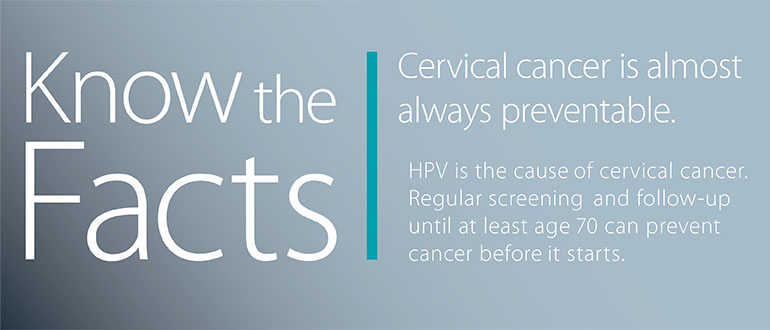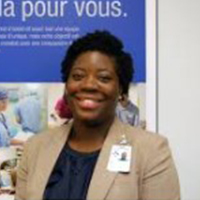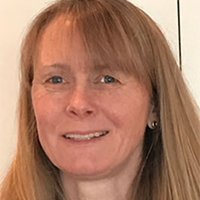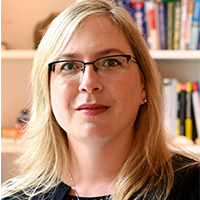toh
Ontario Cervical Screening Program

The Ontario Cervical Screening Program is an organized screening program run by Cancer Care Ontario. The program’s goal is to reduce the risk of developing or dying from cervical cancer by increasing the percentage of women who get screened regularly and who have timely and appropriate follow-up of abnormal results. The program sends letters to Ontario women inviting them for Pap testing, advising them of next steps following a Pap test and reminding them when it is time to return for screening. The program supports doctors and nurse practitioners so they can provide the best possible cervical screening for their patients.
When to Screen
The Ontario Cervical Screening Program recommends that women who are or have been sexually active have a Pap test every 3 years starting at age 25. Regular screening should continue until at least age 70 or when advised by a doctor or nurse practitioner to stop. Pap tests can stop at the age of 70 if a woman has had 3 or more normal tests in the previous 10 years.
Women ages 25 to 70 need to get cervical screening even if they:
- feel healthy and have no symptoms
- are no longer sexually active
- have only had 1 sexual partner
- are in a same-sex relationship
- have been through menopause
- have no family history of cervical cancer
- have received the HPV vaccine
Women who have had a hysterectomy should talk to their doctor or nurse practitioner to see if they need to continue cervical screening.
How to Screen
The Pap test (also known as the Pap smear) is the most common way to find cell changes in the cervix that may lead to cancer:
A Pap test looks for abnormal cells in the cervix. Sometimes cervical cells become abnormal over time as they die and then renew. They are also abnormal when a woman has a human papillomavirus (HPV) infection. Abnormal cells often return to normal on their own. But if they do not, they need to be found and, if necessary, treated. Otherwise, slowly over a number of years, they may become cervical cancer.
A Pap test does not test for other cancers in the reproductive organs, such as ovarian cancer, or for sexually transmitted infections, such as chlamydia, gonorrhea or HIV.
A Pap test is done in a healthcare provider’s office, either by a doctor or nurse practitioner. An instrument called a speculum is inserted into a woman’s vagina so her cervix can be seen. Cells are taken from the surface of the cervix and are sent to a laboratory to be examined under a microscope. Some women may find it uncomfortable or embarrassing, but it takes only a few minutes.
Where to Get Screened
Make an appointment with your doctor or nurse practitioner. If you do not have a doctor or nurse practitioner, you can register for Health Care Connect at 1-800-445-1822 or visit the Health Care Connect website Find a doctor (opens in a new tab)
Some public health units and community health centres also provide Pap tests.
For information on healthcare services in your community, visit: Health Care Options (opens in a new tab)
The Pap test is sent to a lab. The results are sent back to the doctor or nurse practitioner who will then advise the patient on appropriate follow-up.
Screening Letters Sent to the Public
Cancer Care Ontario sends letters to eligible women ages 30 to 69 to book a Pap test through the Ontario Cervical Screening Program. We also send letters to women ages 21 to 69 to inform them of their test results and remind them when it is time to return for screening.
Letters Women May Receive
- Correspondence privacy notice
- Invitation and recall letters
- Invitation and recall reminder letters
- Normal result letter
- Unsatisfactory result letter
- Abnormal result letter
- Abnormal result follow-up reminder
Resources for the Public
Pap Test Information
- Pap test brochure – Take a Closer Look (opens in a new tab)
- Cervical Cancer Screening – What your abnormal Pap test means (opens in a new tab)
Human Papillomavirus (HPV)
- Human Papillomavirus (HPV) and cervical cancer (opens in a new tab)
- Public Health Agency of Canada HPV Vaccine Q&A (opens in a new tab)
Helpful Websites
Our Team

Ellen Odai Alie
Manager, Integrated Cancer Screening and Prevention and Corporate Manager, Breast Imaging

Dr. Anna Wilkinson
Regional Primary Care Lead

Dr. Hélène Gagné
Regional Cervical Screening and Colposcopy Lead
Last updated on: July 19th, 2021


 To reset, hold the Ctrl key, then press 0.
To reset, hold the Ctrl key, then press 0.